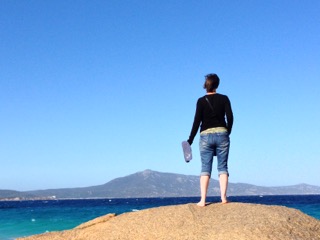
I recently read Chocolat and, without giving spoilers away, there’s a bit when one of the characters falls pregnant. What follows is a rather euphoric description of this woman feeling ‘full’ and ‘satisfied’. As though being pregnant, and having children, makes a woman complete.
I am not in any way deriding this novel, which was a perfectly delightful and naughtily delicious story. But it reminded me that many women believe pregnancy is the epitome of womanhood, and that the only way to be a whole and complete woman is to have children.
Many women believe pregnancy is the epitome of womanhood.
Poppycock. Excuse my French.
If that were true, none of us childless women would be real.
So what makes a real woman ‘real’? Is it the mood swings? The physical anatomy? The evidence of fertility? I used to think having a vagina made one a woman. But what about transgender women who may not be born with typical female anatomy? And what about women who have body parts altered or removed? Does that alter their inherent womanhood?
Or does ‘real’ womanhood run deeper than that?
Does ‘real’ womanhood run deeper than that?
Typical definitions of womanhood come off shallow. In the movie Erin Brockovich, one of the sick women asks Erin at a particularly poignant moment: ‘You think if you got no uterus and no breasts you’re still technically a woman?’ Erin’s quippy response assures her she’ll be a happier woman because she won’t have to worry about maxi-pads and underwire.
But beneath the humour is an undertone beset with anxiety and horror, the thought of not being a ‘real’ woman. Womanhood cannot be defined by our bodily functions or anatomy. It cannot be defined by whether we are able to fall pregnant or have children.
Even when I consider the ‘girly’ aspects of my own personality, I come against what are merely stereotypes: the dressing up, drinking mocktails, having giggly conversations with girlfriends. But girliness does not make me a ‘real’ woman. It cannot wholly define me.
Girliness does not wholly define me.
I have other aspects of my personality beyond that: a sense of humour, a love of playfulness, a preference for introversion. I even have characteristics that may be considered stereotypically masculine: an interest in geeky things, an enjoyment of LEGO and trainsets, a love of Star Wars and science fiction. Do these make me less of a woman? I think not.
So why do we, as childless women, feel less than ‘real’ women? For me it stems from grief. I was curious about how it would feel to be pregnant, how it would feel to have a little one crawling around the house, making a mess of everything. And now I will never know. Part of me feels like I have missed something in my womanly potential.
I connect with womanhood by being authentically myself.
Now I connect with womanhood by being authentically myself. I connect with the real Steffie who loves animals and nature and sci-fi and wordplay and chocolate. I connect with God, who loves me exactly as I am, not for my motherly capacity. And I connect with other women, some mothers, some childless, all who are living their lives openly and authentically.
That’s me being a ‘real’ woman. Take that, stereotype.
How do you connect with ‘real’ womanhood? How can we remind ourselves, and other childless people, of our inherent worth? Share your story. Let’s have a countercultural conversation.